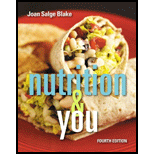
Nutrition & You (4th Edition)
4th Edition
ISBN: 9780134167541
Author: Joan Salge Blake
Publisher: PEARSON
expand_more
expand_more
format_list_bulleted
Concept explainers
Question
Chapter 5, Problem 3TF
Summary Introduction
To examine: Whether the statement, “A healthy diet is very low in fat”, is true or false.
Introduction: A balanced diet is required for a healthy living. It is essential to keep or create a balance in one’s food habits so that the body can meet daily nutritional requirement without facing any deprivation for a healthier lifestyle. There is some amount of energy stored in food called as calories that are daily required for the body.
Expert Solution & Answer
Want to see the full answer?
Check out a sample textbook solution
Knowledge Booster
Learn more about
Need a deep-dive on the concept behind this application? Look no further. Learn more about this topic, health-nutrition and related others by exploring similar questions and additional content below.Similar questions
- The preferred energy sources for the body are ________.arrow_forwardWhich of the following statements is not true? a. Essential nutrients can be synthesized by the body. b. Vitamins are required in small quantities for bodily function. c. Some amino acids can be synthesized by the body, while others need to be obtained from diet. d. Vitamins come in two categories: fat-soluble and water-soluble.arrow_forwardEffects of Dietary Fats on Lipoprotein Levels Cholesterol that is made by the liver or that enters the body from food does not dissolve in blood, so it is carried through the bloodstream by lipoproteins. Low-density lipoprotein (LDL) carries cholesterol to body tissues such as artery walls, where it can form deposits associated with cardiovascular disease. Thus, LDL is often called bad cholesterol. Highdensity lipoprotein (HDL) carries cholesterol away from tissues to the liver for disposal, so HDL is often called good cholesterol. In 1990, Ronald Mensink and Martijn Katan published a study that tested the effects of different dietary fats on blood lipoprotein levels. Their results are shown in Figure 2.23. In which group was the level of LDL (bad cholesterol) highest?arrow_forward
- Effects of Dietary Fats on Lipoprotein Levels Cholesterol that is made by the liver or that enters the body from food does not dissolve in blood, so it is carried through the bloodstream by lipoproteins. Low-density lipoprotein (LDL) carries cholesterol to body tissues such as artery walls, where it can form deposits associated with cardiovascular disease. Thus, LDL is often called bad cholesterol. Highdensity lipoprotein (HDL) carries cholesterol away from tissues to the liver for disposal, so HDL is often called good cholesterol. In 1990, Ronald Mensink and Martijn Katan published a study that tested the effects of different dietary fats on blood lipoprotein levels. Their results are shown in Figure 2.23. Figure 2.23 Effect of diet on lipoprotein levels. Researchers placed 59 men and women on a diet in which 10 percent of their daily energy intake consisted of cis fatty acids, trans fatty acids, or saturated fats. Blood LDL and HDL levels were measured after three weeks on the diet; averaged results are shown in mg/dL (milligrams per deciliter of blood). All subjects were tested on each of the diets. The ratio of LDL to HDL is also shown. Source, Mensink RP, Katan MB, Effect of dietary trans fatty acids on high-density and low-density lipoprotein cholesterol levels in healthy subjects. NEJM 323(7):43945. An elevated risk of heart disease has been correlated with increasing LDL-to-HDL ratios. Rank the three diets according to their predicted effect on cardiovascular health.arrow_forwardExcess carbohydrates and proteins are stored as _____. a. amino acids b. starches c. fats d. monosaccharidesarrow_forwardMaintaining normal body weight requires that __________ intake be balanced by _________ output.arrow_forward
arrow_back_ios
arrow_forward_ios
Recommended textbooks for you
 Comprehensive Medical Assisting: Administrative a...NursingISBN:9781305964792Author:Wilburta Q. Lindh, Carol D. Tamparo, Barbara M. Dahl, Julie Morris, Cindy CorreaPublisher:Cengage Learning
Comprehensive Medical Assisting: Administrative a...NursingISBN:9781305964792Author:Wilburta Q. Lindh, Carol D. Tamparo, Barbara M. Dahl, Julie Morris, Cindy CorreaPublisher:Cengage Learning Human Biology (MindTap Course List)BiologyISBN:9781305112100Author:Cecie Starr, Beverly McMillanPublisher:Cengage Learning
Human Biology (MindTap Course List)BiologyISBN:9781305112100Author:Cecie Starr, Beverly McMillanPublisher:Cengage Learning- Lifetime Physical Fitness & WellnessHealth & NutritionISBN:9781337677509Author:HOEGERPublisher:Cengage

Comprehensive Medical Assisting: Administrative a...
Nursing
ISBN:9781305964792
Author:Wilburta Q. Lindh, Carol D. Tamparo, Barbara M. Dahl, Julie Morris, Cindy Correa
Publisher:Cengage Learning

Human Biology (MindTap Course List)
Biology
ISBN:9781305112100
Author:Cecie Starr, Beverly McMillan
Publisher:Cengage Learning



Lifetime Physical Fitness & Wellness
Health & Nutrition
ISBN:9781337677509
Author:HOEGER
Publisher:Cengage
